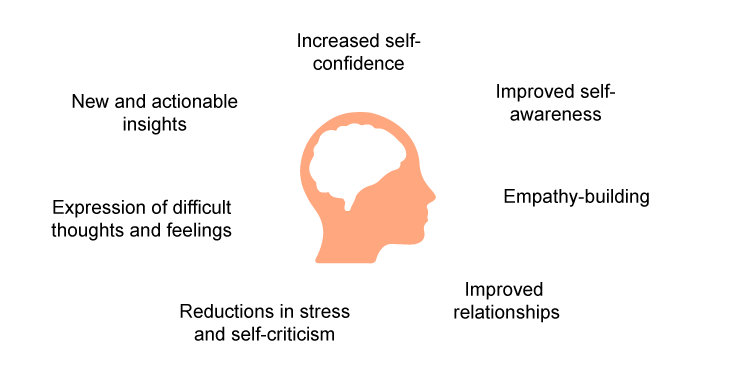This website uses cookies. Continuing to use this website means you are okay with this but if you want to find out
more about your cookie choices click
here.
OkayProReal helps people think and feel better, about themselves and their world:

We have been developing and improving ProReal over the past seven years, combining insights from academic studies with feedback from our clients and practitioners. There is a growing body of evidence for the effectiveness of our software in different settings.
Research Findings in Adults
ProReal helps people to:
- Develop insights, into their selves, their relationships and their emotions
- Identify and label thoughts, feelings and behaviours, and recognise relationships between themes
- Express and gain distance from difficult thoughts and feelings
- Engage and participate in talking therapies, counselling and coaching that they have previously found difficult
- Develop empathy for others and understand others’ perspective
In common with other virtual reality interventions, ProReal provides a powerful experience which can be a useful for complex environments and difficult situations.
Research Findings in Young People
ProReal helps young people to:
- Express themselves and externalise their inner worlds
- Address presenting psychological issues
- Engage in talking therapies or counselling, which many young people find difficult
- Communicate better with their counsellor or therapist
- Reappraise difficult thoughts, feelings and experiences
- Gain insights into their emotions and relationships
- Be more self-compassionate and mindful
ProReal is associated with significant reductions in psychological distress, particularly in young males and clients who may find verbal expression difficult, when used as part of a school counselling intervention. Use of the software has low drop-out rates and high ratings of satisfaction.
We have been pleased to work with independent academic researchers from some of the most highly regarded universities and research facilities in the world. To find out more, use the links below:
| July 2015 | Avatar-Based Therapy within Prison Settings: Pilot Evaluation (click to open in a new tab)
Prof. Mick Cooper, Dr Evi Chryssafidou, Dr Biljana vn Rijn, Andrew Jackson |
| June 2016 | ProReal Avatar-Based Counselling with Young People (click to open in a new tab)
Prof. Mick Cooper, Dr Evi Chryssafidou, Dr Biljana van Rijn |
| February 2017 | Avatar-Based Counselling within a School Setting. Case Study ‘Richard’ Research Report (click to open in a new tab)
Dr Biljana vn Rijn, Dr Caroline Falconer, Prof. Mick Cooper, Dr Evi Chryssafidou, Prof. William Stiles |
| October 2017 | Adjunctive Avatar Therapy for Mentalisation-Based Treatment for people with a diagnosis of Borderline Personality Disorder (click to open in a new tab)
Dr Caroline Falconer, Penny Cutting, Bethan Davies, Prof. Chris Hollis, Prof. Paul Stallard, Dr Paul Moran |
| November 2017 | Evaluating Avatar-Based Therapy for Young People with Eating Disorders (click to request a copy)
Liv-Rebekka Pedersen |
| August 2018 | Avatar-Based VR in CAMHS Case Study (click to open in a new tab)
Dr Caroline Falconer, Rebecca Grist, Bethan Davies, Prof. Paul Stallard |
| October 2019 | Evaluation of avatar-assisted therapy in Bradford Community Mental Health Psychological Therapy Services and Early Intervention in Psychosis (click to open in a new tab)
Nicola Holt |
| March 2020 | Searching for safety: Building meaning bridges using digital imagery in school counselling with a female adolescent, ‘Sally’ (click to open in a new tab)
Dr, Biljana van Rijn , Prof. William B. Stiles , Dr. Evi Chryssafidou |
| June 2021 | ProReal®: The ‘good enough’ online alternative to face-to-face Dramatherapy (click to open in a new tab)
Quigley, C.A. |
| December 2021 | An Executive Summary of learning and outcomes from the MiHUB project (click to open in a new tab)
C.B. Matheson-Monnet and G. Riley |
| January 2022 | Implementing ‘ProReal’ a therapeutic avatar platform to enhance engagement with online psychosocial groups for young people in mental health services: A mixed methods feasibility pilot: EXECUTIVE SUMMARY (click to open in a new tab)
E. Robson and K. Greenwood |
| November 2022 | Acceptability and feasibility of using avatar-based virtual world software as an adjunct to clinical interventions, training, and reflective practice in a medium secure setting: A qualitative interview study (click to open in a new tab)
Mason, K et al |
